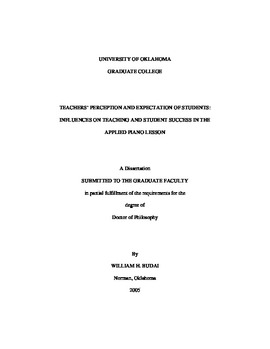| dc.contributor.advisor | Barry, Nancy, | en_US |
| dc.contributor.advisor | Magrath, Jane, | en_US |
| dc.contributor.author | Budai, William H. | en_US |
| dc.date.accessioned | 2013-08-16T12:19:58Z | |
| dc.date.available | 2013-08-16T12:19:58Z | |
| dc.date.issued | 2005 | en_US |
| dc.identifier.uri | https://hdl.handle.net/11244/947 | |
| dc.description.abstract | These perceptions and the resulting expectations had a direct impact on the teacher's behavior in the lesson. Fifty-three general teaching strategies as well as 36 student-specific teaching strategies were identified. The teaching strategies employed by both novice and experienced teachers varied with their perception of the student as either talented or less proficient. The disparate teacher interactions in turn directly affected the student's success or failure in the piano lesson. In addition to the teacher's perception and the student's attitude, the role of the parent was also established as an important factor determining the student's success or failure in the applied piano lesson. | en_US |
| dc.description.abstract | Four novice and four experienced teachers completed an instructional survey, were interviewed by the researcher, and were videotaped teaching a "talented" student and a "less proficient" student over four lessons. Eight lessons were videotaped with each teacher, 64 lessons total for the study. In addition, two independent panels of three observers reviewed the videotapes to identify and code the teacher's behavior in the lesson. The data from the surveys, the interviews, and videotapes were integrated using the grounded theory methodology of qualitative research. | en_US |
| dc.description.abstract | Seventy-six distinct student characteristics affecting a teacher's perception were identified. These included physical, cognitive, and behavioral characteristics and were classified as either student-independent---naturally occurring characteristics outside the control or power of the student (those characteristics the student cannot change) or student-dependent---characteristics or learned behaviors within the control or power of the student to change, modify, or develop. Of the 76 behaviors identified, the student's attitude was found to be of greatest significance. Teachers' perceptions and expectations were also affected by their own background, beliefs, and the goals they set for themselves and their students. | en_US |
| dc.description.abstract | Teachers' expectations are inferences made about the future behavior or achievement of a student, based on what the teacher knows about the student at the given moment. These inferences can eventually cause a student to behave or achieve in ways that confirm the teacher's expectations. The purpose of this study was to determine how novice and experienced piano teachers' perceptions and expectations of their students influenced their teaching. | en_US |
| dc.format.extent | xi, 138 leaves : | en_US |
| dc.subject | Education, Music. | en_US |
| dc.subject | Teacher effectiveness. | en_US |
| dc.subject | Piano Instruction and study. | en_US |
| dc.subject | Music. | en_US |
| dc.title | Teachers' perception and expectation of students: Influences on teaching and student success in the applied piano lesson. | en_US |
| dc.type | Thesis | en_US |
| dc.thesis.degree | Ph.D. | en_US |
| dc.thesis.degreeDiscipline | School of Music | en_US |
| dc.note | Advisers: Nancy Barry; Jane Magrath. | en_US |
| dc.note | Source: Dissertation Abstracts International, Volume: 66-12, Section: A, page: 4332. | en_US |
| ou.identifier | (UMI)AAI3203307 | en_US |
| ou.group | Weitzenhoffer Family College of Fine Arts::School of Music | |
